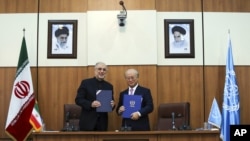The United Nations and Iran have announced an agreement to cooperate on resolving outstanding issues regarding the country's nuclear program. Meanwhile, U.S. Secretary of State John Kerry said critics of a separate bid to limit Iran's nuclear activity need to let negotiations take their course.
Talks Monday between the head of the International Atomic Energy Agency, Yukiya Amano, and the Iranian nuclear chief, Ali Akbar Salehi, yielded a roadmap that will allow for wider U.N. inspections, including at a heavy water reactor site and a uranium mine.
The IAEA has been focused for two years on reaching a deal with Iran to gain greater access to documents regarding the country’s nuclear program, in addition to related personnel and sites.
Meanwhile, Kerry said on Monday during a visit to Abu Dhabi that critics, including Israeli Prime Minister Benjamin Netanyahu, must recognize that world powers have not yet reached any agreement in their talks with Iran.
He said the United States, Britain, France, China, Russia and Germany were united on the plan they presented to Iranian negotiators Saturday in Geneva, but that Iran could not accept it at that time.
The powers are seeking to persuade Iran to suspend work that could allow it to build nuclear weapons in exchange for the easing of some sanctions against Iran. Those negotiations are due to resume next week.
Israel, which calls Iran's nuclear drive a mortal threat, has warned against any deal that would leave some of Iran's nuclear fuel-making capacity intact while giving Tehran respite from sanctions.
Kerry said on Monday that it would not be responsible to ignore an opportunity to come to a verifiable agreement with Iran that would prevent it from developing nuclear weapons.
There has been hope that the election of new moderate Iranian President Hassan Rouhani in June will lead to progress in both the talks with the IAEA and the group of six world powers.
Rouhani told his parliament on Sunday that Iran will not give up what it considers its nuclear rights, including the right to enrich uranium on Iranian soil, in any deal with international negotiators.
Talks Monday between the head of the International Atomic Energy Agency, Yukiya Amano, and the Iranian nuclear chief, Ali Akbar Salehi, yielded a roadmap that will allow for wider U.N. inspections, including at a heavy water reactor site and a uranium mine.
The IAEA has been focused for two years on reaching a deal with Iran to gain greater access to documents regarding the country’s nuclear program, in addition to related personnel and sites.
Meanwhile, Kerry said on Monday during a visit to Abu Dhabi that critics, including Israeli Prime Minister Benjamin Netanyahu, must recognize that world powers have not yet reached any agreement in their talks with Iran.
He said the United States, Britain, France, China, Russia and Germany were united on the plan they presented to Iranian negotiators Saturday in Geneva, but that Iran could not accept it at that time.
The powers are seeking to persuade Iran to suspend work that could allow it to build nuclear weapons in exchange for the easing of some sanctions against Iran. Those negotiations are due to resume next week.
Israel, which calls Iran's nuclear drive a mortal threat, has warned against any deal that would leave some of Iran's nuclear fuel-making capacity intact while giving Tehran respite from sanctions.
Kerry said on Monday that it would not be responsible to ignore an opportunity to come to a verifiable agreement with Iran that would prevent it from developing nuclear weapons.
There has been hope that the election of new moderate Iranian President Hassan Rouhani in June will lead to progress in both the talks with the IAEA and the group of six world powers.
Rouhani told his parliament on Sunday that Iran will not give up what it considers its nuclear rights, including the right to enrich uranium on Iranian soil, in any deal with international negotiators.





